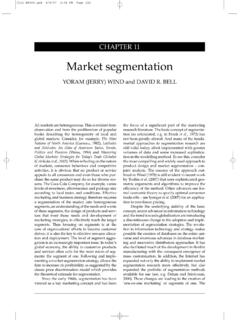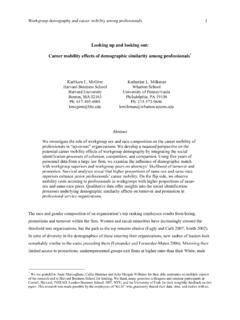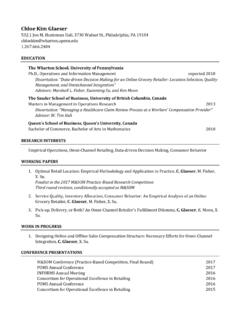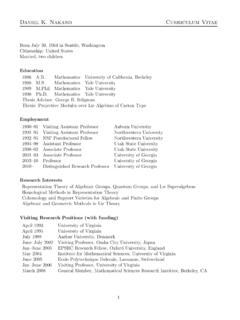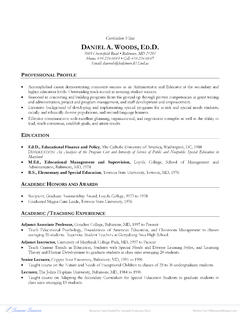Transcription of Curriculum Vitae Daniel A. Levinthal - Wharton Faculty
1 Curriculum Vitae Daniel A. Levinthal Department of Management, The Wharton School 2000 Steinberg-Dietrich Hall University of Pennsylvania Philadelphia, PA 19104-6370 Education 1985 Ph. D., Economics, Business, and Public Policy Graduate School of Business, Stanford University 1979 BA, Harvard University Employment 1998-present University of Pennsylvania The Wharton School Professor of Management 1989-1998 University of Pennsylvania The Wharton School Associate Professor of Management 1985-1989 Carnegie Mellon University Graduate School of Industrial Administration Assistant Professor of Economics and Industrial Administration 1983-1985 Carnegie Mellon University Graduate School of Industrial Administration Instructor of Economics and Industrial Administration Visiting Positions 2012-2013 Michael Crouch Visiting Professorial Fellow University of New South Wales June 2003 Philip Morris Visiting Professor
2 Sant Anna School of Advanced Studies University of Pisa 1998-1999 Bower Fellow Harvard Business School, Harvard University Honors Irwin Award as Distinguished Educator, Business Policy Division of the Academy of Management 2015 Honorary Doctorate, Tilburg University 2014 Fellow of the Strategic Management Society 2011 Fellow of the Academy of Management 2010 Distinguished Scholar Award, Organizational and Management Theory, Academy of Management 2010 Honorary Doctorate, University of Southern Denmark 2010 2 Publications D. Levinthal and A. Marino (2015). Three facets of organizational adaptation: Selection, variety, and plasticity.
3 Organization Science, 743-755. M. Cohen, D. Levinthal , and M. Warglien (2014). Collective performance: Modeling the interaction of habit-based actions . Industrial and Corporate Change, 23: 329-360. T. Knudsen, D. Levinthal , and S. Winter (2014). Hidden but in plain sight: The role of scale adjustment in industry dynamics . Strategic Management Journal, 35: 1569-1584. B. Wu, Z. Wan, and D. Levinthal (2014). Complementary assets as pipes and prisms: Innovation incentives and trajectory choice , Strategic Management Journal, 36: 1257-1278. D. Levinthal (forthcoming). Learning and adaptation . Palgrave Encyclopedia of Strategic Management.
4 Edited by D. Teece and M. Augier. D. Levinthal and L. Marengo (forthcoming). Simulation modeling and business strategy research . Palgrave Encyclopedia of Strategic Management. Edited by D. Teece and M. Augier. C. Rerup and D. Levinthal (2013). Situating the Concept of Organizational Mindfulness: The Multiple Dimensions of Organizational Learning . Guido Becke (Ed.) Mindful Change in Times of Permanent Reorganization. Springer, New York. D. Levinthal (2012). From the Ivy Tower to the C-Suite: Garbage Can Processes and Corporate Strategic Decision Making in R. Harrison and A. Lomi (eds.) The Garbage Can Model of Organizational Choice: Looking Forward at Forty.
5 Research in the Sociology of Organizations, Volume 36, pp 333-346. G. Gavetti, H. Greve, D. Levinthal , and W. Occasio (2012). The Behavioral Theory of the Firm: Assessment and Prospects, The Academy of Management Annals, 6:1, 1-40. H. Posen and D. Levinthal (2012). Chasing a Moving Target: Exploration and Exploitation in a Dynamic Environment. Management Science, 58: 587-601. D. Levinthal (2011). A Behavioral View of Strategy --- What s the Alternative? Strategic Management Journal, 32: 1517-1524. D. Levinthal and B. Wu (2010). The Rational Tradeoff between Corporate Scope and Profit Margins: The Role of Capacity-Constrained Capabilities and Market Maturity.
6 Strategic Management Journal, 31: 780-801. C. Fang and D. Levinthal (2009). The Near-Term Liability of Exploitation: Exploration and Exploitation in Multi-Stage Problems. Organization Science, 20: 538-551. S. Ethiraj and D. Levinthal (2009). Hoping for A to Z while Rewarding only A: Complex Organizations and Multiple Goals . Organization Science, 20: 4-24. P. Ghemawat and D. Levinthal (2008). Choice Structures and Business Strategy . Management Science, 54: 1638-1651. D. Levinthal (2008). Understanding the Role of Novelty in Organizational Adaptation . In J. March, Explorations in Organizations. Stanford University Press, Stanford, CA.
7 3 R. Adner and D. Levinthal (2008). Doing versus Seeing: Acts of Exploitation and Perceptions of Exploration . Strategic Entrepreneurship Journal, 2: 43-52. S. Ethiraj , D. Levinthal , and R. Roy (2008) The Dual Role of Modularity: Innovation and Imitation . Management Science, 54: 939-955. D. Levinthal and H. Posen (2007). Myopia of Selection: Does Organizational Adaptation Limit the Efficiency of Population Selection? Administrative Science Quarterly, 52: 586-620. D. Levinthal (2007). Technology: The role of network structures . Strategic Entrepreneurship Journal, 1: 189-190. G. Gavetti, D. Levinthal , and W. Ocasio.
8 (2007). Neo-Carnegie: The Carnegie School s Past, Present, and Reconstructing for the Future . Organizational Science, 18: 523-536. Levinthal , D. (2007). Bringing selection back into our evolutionary theories of innovation . F. Malerba and S. Brusoni (eds.). Perspectives on the Economics of Innovation. Cambridge University Press. Knudsen, T. and D. Levinthal (2007). Two faces of search: Alternative generation and alternative evaluation . Organizational Science,18: 39-54. Levinthal , D. and C. Rerup. (2006). Crossing an apparent chasm: Bridging mindful and less-mindful perspectives on organizational learning . Organizational : 502-513.
9 Levinthal , D. (2006). The Neo-Schumpeterian Theory of the Firm and the Strategy Field . Industrial and Corporate Change, 15(2): 391-394. Levinthal , D. (2006). Comments on the Resource Allocation Process . In J. Bower and C. Gilbert (eds.). From Resource Allocation to Strategy. Oxford University Press. G. Gavetti, D. Levinthal , and J. Rivkin (2005). Strategy-Making in Novel and Complex Worlds: The Power of Analogy . Strategic Management Journal, 26: 691-712. Gavetti, G., D. Levinthal , and J. Rivkin (2005). Strategy making in novel and complex worlds: The power of analogy. Strategic Management Journal, 26: 691-712. Siggelkow, N.
10 And D. Levinthal (2005). Escaping real (non-benign) Competency Traps: Linking the Dynamics of the Organizational Structure to the Dynamics of Search . Strategic Organization, 3: 85-115. Ethiraj, S. and D. Levinthal (2004). Bounded Rationality and the Search for Organizational Architecture: An Evolutionary Perspective on the Design of Organizations and their Evolvability . Administrative Science Quarterly, 49: 404-437. Gavetti, G. and D. Levinthal (2004). Strategy Field from the Perspective of Management Science . Management Science, 50: 1309-1318. Denrell, J., C. Fang, and D. Levinthal (2004). From T-Mazes to Labyrinths: Learning from Model-Based Feedback.
